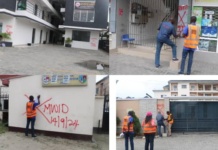
Mr. Nathaniel Atebije, is the President of the Nigerian Institute of Town Planners. In this interview with DAYO JACOB, the astute professional is of the opinion that paying lip-service to the issues of physical planning and lack of implementation of cities and rural area plans are responsible for various disasters and lopsided developments being witnessed in Nigeria
Maiduguri ‘s flood was so devastating, don’t we have plans in place to avert such?
We know the course of nature, the whole excess of planning is to avoid disaster. What we are seeing now is disaster. When you see disaster, it means that we are not ready to plan. The problem we have in Nigeria is that our priorities are not always right. The priorities of Nigerians are driven by their greed, and it is just the person that makes the loudest noise that wins the debate; meanwhile we have silent killers and these silent killers are planlessness.
There was a time I told the Federal Government that look, the only thing we have that belongs to all of us, that cannot be increased in any way on the island. Meanwhile, the population is increasing; the demands of people are increasing now. If we cannot increase land, is it not better for us to plan? Planning is not only for the living, it is also for the dead, and now we are not even caring to plan for the living. The whole thing that is happening, this disaster is as a result of refusal to plan.
Maiduguri has a master plan that was done in the 70s, how much of it was implemented? Planning is not a one-off assignment. When you do it, you review it from time to time so that you can incorporate the new reality, the ideal reality. It takes a lot to plan towns and cities, but our friends, who are in politics, are only thinking about short term measures which are not comprehensive.
It is just inflicting wounds without even looking at the real source of the problem and that is where we are.
What do you mean the ravaging flood is as a result of lack of planning?
The number one thing is that, it is as a result of not having plans and people do not give value to planning. When they make an effort to plan, implementing it becomes a problem. So what is the purpose of planningif we are not ready to implement?
Policy makers just dump development anyhow without thinking about the implications of the development, without getting ready. If they are getting ready for the best place, they should also get ready for the worst day. This is how a planner thinks, when you are planning, you are looking for the best of tomorrow.You should always think! What if there are some man-made causes in the whole essence of your planning, what are you going to do and then you have a balanced equation of how to organize your environment to avoid disaster.
Is it possible to plan for a natural disaster just as it happened in Maiduguri?
There is! That is the whole essence of planning. In the area of volcanic eruption, we have technologies today. We use what we call comprehensive investigation that helps to know the capacity of what is under the soil and, if there are grave dangers in some places, you can understand. If everyone plans, whatever we call natural disasters will be minimized. It is not as if it will not come but there will always be a way out.
The rest of the country, especially the south west region has been advised to prepare for floodwaters. How can this be curtailed?
Well in Nigeria, we do not have comprehensive master plans. There is what we call the infrastructure plan, but this thing just generalized at the national level. We need to get into the details of how to manage each environment through seeking master plans, rural area plans, and taking care of such disasters. Like now, if you listen to my conference in February this year, I warned about flooding. It is not today, if we go to the Bible time , the time they had never seen flooding., infact, one we can even give it to them because they had issues like ignorance when God was telling them that he was going to bring flood to destroy the earth and he told Noah to make an ark. They said he was not serious until the flood came. Today, we have early warning signs by NIMET. The agency has been telling us from the beginning of the year to let us get prepared and people would not simply listen to such advice.
We cannot plan and those that have the technology to tell us that look, since we have refused to plan, disaster can come in, get ready for it, get to areas that will be less involved, nobody takes heed to that advice. That is why we are having what we are having now. What I’m trying to say is that let us plan now. We should get ready, move out of areas that are prone to flooding. There was a time when we were doing resilience studies for the Federal Ministry of Housing and Urban Development. We did some in Lokoja. We saw people who were just happy to live in the flood plains, and because they were having some kind of relieve annually when the flood is coming up, they will just carry their mattresses, getting ready for the Ministry of Environment to come and carry them and put them in some IDPs where they could get some free feeding and free facilities. But this cannot be like your home, so why not move out of the flood- prone zone. Government should embark on planning so that we can forget about this disaster. It’s not good for us as a nation.
You talked about the city management plan, how much advocacy has your association embarked to draw the attention of policy makers?
Last year when I came in as the President of my professional body, I had not less than 70 to 80 engagements with the press both electronic and print media. This year, there are even many more press conferences in various media. We have been making a lot and even now we have a weekly program. You know what that means. Now since the beginning of the year, we have been running a weekly program on Housing Television every Thursday by 10:30 a.m. In fact, we have talked about flooding this year in our advocacy but yet, people do not want to yield to it.
How much technology can we deploy to manage this flood crisis?
Well, the technology for managing flooding is very very simple. We already have the Nigeria Meteorological Agency (NiMET) getting data everyday, predicting weather, telling us what is going to happen to some extent, even from the beginning of the year. So we have good technological technique, the next technology we need to bring is the technology for planning, which we have in-house. We have qualified town planners in Nigeria that should be able to make plans for us but government sees it as a waste of time, a waste of energy. Look at Abuja, some of the abuses in land use that makes some places susceptible to flooding are done by government themselves.
Look at our original planning law, since 1992 up till today, they have not implemented the provisions of the law.
Let’s look at flood management. What should be our thinking forward in order to avert what happened in Borno State?
This is the challenge we have with people in the policy making office and the political class
Many times, they think they want to answer a question and they are using wrong methods. They just put people who will be able to describe their own political interest without thinking of the real inputs of the professionals.
Now, they say they are doing Renew Hope Cities and Housing Estates, and they have been going round launching these things. From the report that I have got, town planners have not been carried along.










